From Side Hustle to a $20M-a-Year Business
When Bryan and his co-founders set out to launch GreenPal, things didn't quite go as planned.
And it was something they learned the hard way: investing $150,000 and eight months to have a local developer build their platform, only to have it fail.
That's when they realized: If you want to be in tech, you have to learn how to build software.
Keeping that in mind, and putting customer service and retention at the forefront of their business, Bryan and his partners drove GreenPal to a $20 million-a-year business.
He joins us on this episode of Start Yours to share his inspirational journey to entrepreneurial success and gives us some valuable tips and advice.
Whether you're selling physical products or services, this is one episode you'll be learning lots from.
We hope you enjoy the podcast and will consider subscribing. Don't forget to hop on over to theOberlo blogfor more content.
Short on time? Here's a seven-point TL;DR version:
- Bryan first taste of the lawn mowing business came when his father told him to get off the Nintendo and mow his neighbor's lawn.
- From there, he launched a 150-strong lawn mowing business and growing it to over $10 million in revenue.
- Business can lend your life purpose. It makes you smarter, more humble, and wiser.
- After spending losing money and time on creating a platform for GreenPal, Bryan and his partners decided to take things into their own hands and learn how to code.
- A business partnership is, in many ways, more serious and harder to unwind and reverse than a traditional marriage.
- Customer feedback is not happeningtoyou as the entrepreneur. It's happeningforyou.
- To narrow the gap between customer logic and company logic, Bryan himself still dedicates an hour or two a day to handling customer tickets.
Start Yoursis a podcast about ecommerce, dropshipping, and all things launching a business.
Join us as we meet entrepreneurs who have gone through the triumphs and headaches of running an online store, and learn how they managed to survive and thrive.



Getting off Nintendo and Going Into Entrepreneurship
Aleisha:Bryan, you are such an interesting person with such an interesting story, I don't know really where to begin, but maybe let's begin at the beginning of your current business.
Tell me a little bit about how you got started in the world of lawn mowing. I think this is so interesting. I have a lawn and I look at it sometimes and think sure it'd be good if somebody else could come and help me out with this lawn.
→ Click Here to Launch Your Online Business with Shopify
我nevitably in Australia, I have to come and do it myself, but not the case for where you are. So tell me a little bit about what you do and how it all started.
Bryan:是的,所以我也e been an entrepreneur my entire life, I've never had a job.
Aleisha:Wow.
Bryan:Luckily, I was forced intoentrepreneurshipby my father. On a hot summer day, he interrupted me playing Nintendo and he said, "Get off your butt, you've got a job to do, you're gonna go mow the neighbor's grass."
And he made me go mow the neighbor's lawn. And luckily he did because something about justworking for myselfand earning as much money as I wanted to earn just stuck with me. I remember when I got done mowing that yard, the first thing I did was make some flyers, and I was like 15 years old and passed them around the neighborhood. And by the end of that summer, I had ten customers I was cutting grass for.
我只是坚持草坪割草。我just stuck with it all through high school and all through college, and over a 15-year journey, I've built that into one of the largest landscaping companies in the state where I live, and got it over $10 million in revenue, over 150 employees, and sold that business in 2013.
So I've built that business from just me and a push mower to me and 150 people, and over eight figures in revenue.
我t was a heck of a journey, learned the hard way, a lot of highs and lows on how to build a business. And so after I sold it, I retired. I took some time off and I realized something about myself. It was like, "Whoa, I am wired to love business, I need my business to be my purpose in life," and I didn't have that anymore. And so I thought, "Okay, well, I gotta start the next thing. What is the next thing gonna be?"
And so then the idea for my current business, GreenPal, which is the Uber for lawn mowing, came to me. It was a real straightforward idea, I recruited two co-founders and we have been working on this company for eight years now. We're an eight-year overnight success and we're doing $20 million a year in revenue. So I've spent 20 years in one industry. I didn't set out to be a grass-cutting guy my entire life, but that's just kind of where it took me.
Aleisha:What I love about this story is the fact that your dad... Like it's the traditional thing with the kid, isn’t it? It's like either the paper route or you've got the lawn mowing. But you took it and made it a multi-million dollar business. So it's so inspiring, but also these things where kids are like, "Ah, I can't make any money out of mowing lawns," and you're like, “Hold the lawn, I think you can.” This is pretty good.
Bryan:我'm thinkingthere's some sort of correlation between the least fun, least sexy, least exciting your idea, the higher your probability for success.And if you can look at some of those ideas that just aren't really alluring, that don't seem very glamorous, a lot of times, your competition is not gonna be as stiff and you can kind of take your time and build something strong.
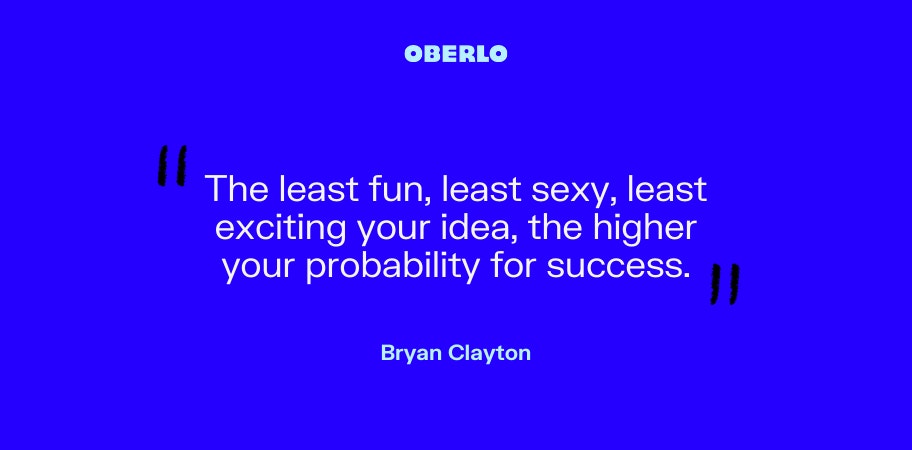
Aleisha:So when you retired and you had that thinking time and you got the itch again, which I think a lot of people listening, whether they've actually explored that itch, it's the sense, "Now, I'm gonna go for it," or they may be sitting in a nine-to-five and wondering how they can jump into something new.
告诉我一点关于这种感觉当你were sitting there thinking, "I'm not done yet. I've got to keep going." 'Cause it's a pretty big leap that you... You were comfortable, obviously, financially, it sounds like with retirement. But then to say, "I'm gonna step back into the workplace and do this again." What was that drive? What was that urge that you felt?
Bryan:我feel like to live a successful life, your life has to... A lot of people over-index on passion. I think it's purpose. I think your life has to have some sort of purpose. And for me, my business has been the source of that purpose.
And so with my first company, I had built it to over 150 people, and the purpose of my life was that business. It was making sure that the company was a good, strong business, so all of my people could get a paycheck every week, and that we could continue to grow the business to give opportunities for the people that worked for it.
So when I sold it, I didn't have that purpose anymore, and that was what was missing.
So I realized that and I thought, "Okay, well, I need the next thing.” But my businesses have always been the forcing function that drives me to learn things I don't wanna learn, to do things I don't wanna do, to be outside of my comfort zone.
And I think that's one of the beautiful things about business is that it can lend your life purpose.我t can literally cause you to be a smarter, more humble, wiser person, and it can be kind of like the thing that lends an interesting storyline to your life, and all of those things kinda culminate into what I love about business and what I get out of running my company.
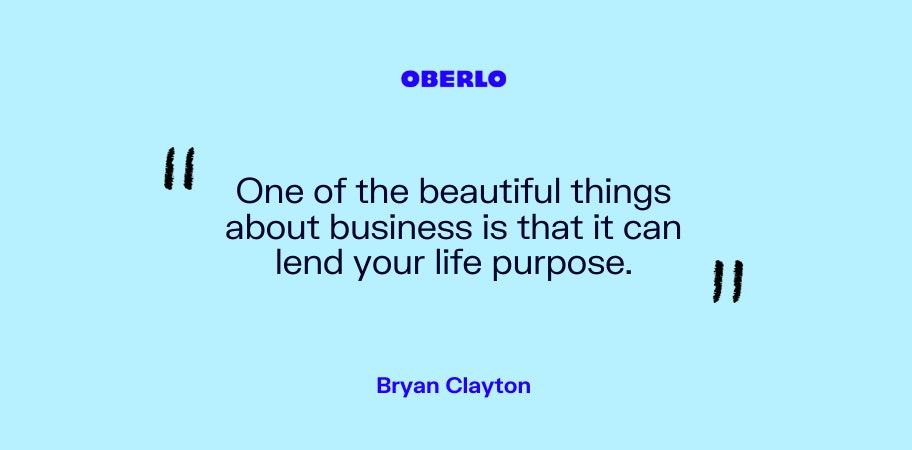
Diving Into the World of Tech
Aleisha:Excellent answer, and I think that's something that I'm sure people would be tapping into right now if they're listening to your story, and then also thinking, "I haven't really found my thing yet, but I've got that feeling."
我think it's really powerful to pursue it and also really unpack what makes you happy and what you wanna do, which is where I was going to lead this next question to. When you said... And I love that it's been described as the Uber for lawn mowing...
→ Click Here to Launch Your Online Business with Shopify
How did you then go about going, "Okay, I had this idea, I think it's gonna work. I've run a similar sort of business before, but now I'm gonna leap into the world of tech," which is obviously huge, very competitive, very expensive when it comes to building things, how did you then make the plan to actually get GreenPal off the ground and fund it and make it what it is now?
Bryan:For the early days, what kinda got me and my two co-founders in the game was a healthy dose of naivety. We really didn't know what we didn't know. We didn't know how hard it was going to be to build just the technological aspect of the app and the platform. We didn't realize the difficulties of crafting a marketplace that connects buyers and sellers. We just didn't know these things, and so that naivety is what kinda got us going.
And then, on the other hand, it was kind of like, "Okay, this is hard. It's a lot harder than we thought it was going to be, but I'm just going to be working on my best idea all the time. That's just it. Failure's not an option. I'm not gonna give up. And so I'm always gonna be just working on my best thing."
And GreenPal was my best thing and still is. I guess, luckily, I'm not very creative, and so I just had this one thing. I was kind of solving my own problem in a way and just kept that.
And so from a practical standpoint, how did we do it? When we started the business, ideally, you'll start one of these tech companies, and you'll bring together a hacker and a hustler, somebody that can do the tech aspect of it, and somebody that is good at sales and can just make the phone ring.
We had three hustlers. We didn't have anybody on the team that understood how to build software, and so that was difficult.
We made a mistake in the early days. We believed if we could just pay somebody to build what we thought GreenPal should be, that we would just market it and be off and running. But that's not how it worked out. We pooled our money together and we spent $150,000 with a local development shop where I live, and they took eight months and built the platform and we launched it, and it was a total failure.
The thing did not work. It didn't have the features it needed, it just didn't fulfill the promise that we were communicating to our customers. And it was really a low point where we realized, "Wow, okay, who are we kidding here? If we're gonna be in the tech business, we're gonna have to learn how to build tech. That's just all there is to it."
So we had to really make the decision what we were gonna do, and so one of my co-founders went to a software boot camp... It was like an eight-hour-a-day thing for six months... And he learned just enough to try to hack together something on the backend, and I learned front-end design and front-end coding.
And over a three-year period of time, we learned the skills we needed to learn ourselves to build software while working on the business while doing the stuff we were learning, and it was a tough, I guess, ticket. It was a tough admission price into the game, I guess you could say, because there's just no way to sidestep that.我f you're gonna build an app, if you're gonna be in the tech business, you're gonna have to learn how to build software.
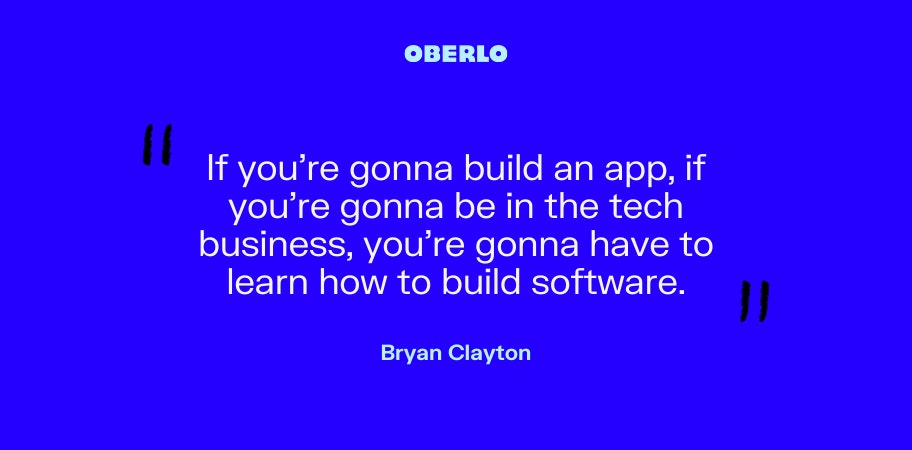
Aleisha:Yeah, and that's such a bold move, but also, you're so right. To know and understand what the hell the programmers and engineers are doing, and where your money's going, I think is such a valuable piece of advice because I think when you don't understand it, and I can't purport to understand a lot of it, but I work for a tech company, and I think I watch a lot about Slack conversations happen and think, gosh, there's just so much that goes into making backend of a company like Shopify and Oberlo work, it's huge.
But also the skills and how fast-paced the industry moves, you've gotta be on your toes all the time to keep updating and making things work, I suppose. So, I love the hackers and hustlers idea, but I also love that you then created a bunch of hackers as well, which is fantastic.
Finding the Right Business Partners
Bryan:What I optimized for when I recruited my two co-founders, I just wanted to work with two other people who wanted something more out of life, who kinda had a chip on their shoulder, who felt like they were capable of great things, who were not satisfied with the status quo and not satisfied with where they were in life. And so that's what I got.
So, luckily, that was enough to help us get through the learning, the technical pieces of it. So, I think you can learn this stuff.
→ Click Here to Launch Your Online Business with Shopify
And I would rather have a motivated person who was just willing to be successful at all costs, who didn't know how to code, than a coder who was lazy and didn't really want anything out of life.
Aleisha:Yeah, totally. And that's I think it's really interesting about finding a partner... Well, tell me about how you found your business partners, are they friends? Are they people that you had had dealings with before?
Bryan:These were two guys that I had known for a long time. They were friends, I trusted them, and as I said, I could just tell that they wanted something more out of life, and they felt likestarting a businesswas the vehicle to that, and that's part of my personal philosophy, I think your business can be your vehicle to great things in life, to improve your station in life, to cause you to be a better person. And so I saw that they recognized that, and that's why I went into business with them.
我deally, they could have come to the table and myself included with the skills we needed. But that's just not how it worked out, and you're not gonna find that unicorn co-founder, you're gonna have to... I think, first, it makes sense to optimize for somebody who just has that drive, has that ambition, is willing to do whatever it takes tobe successful, and then you can learn the other stuff downstream.
Aleisha:Oh, totally. And it's great that you say that 'cause I think a lot of people starting out thinking, "Gosh, this seems like a lot of work to do on my own, I'd love someone to share the load with, but also be able to brainstorm and have those sort of inspirational moments," that I'm sure you've had with your co-founders.
But it can sometimes be hard to find the right people. So, it's nice to think that you've known those guys for a long time, but also trust them and share that sort of friendship with as well.
我s that the advice you would give, if people are looking for business partners, how do we go about finding those people? You seem quite lucky that you've had them in your life already.
Bryan:Got lucky, got very lucky.
Aleisha:我t can be tricky.
Bryan:Got very lucky. And so my advice as it relates tobusiness partners, is to try to do it without partners, to try to figure out a way… Because a partnership,业务伙伴关系在许多方面更多的事后s and harder to unwind and reverse than a traditional marriage.
You think about the person you marry, you wanna spend the rest of your life with them, you're gonna date them for a year or two, three years, sometimes longer, you're gonna really put a lot of weight in that decision, whereas a lot of people will start a business with a partner and not even know them more than a month.
And the reality is, it's a lot harder to unwind that business partnership.
And if your business is successful, you're gonna spend a decade with this person, and you may even, in a weird way, in a cynical way, you'll spend more time with this business partner than you will with your actual spouse.
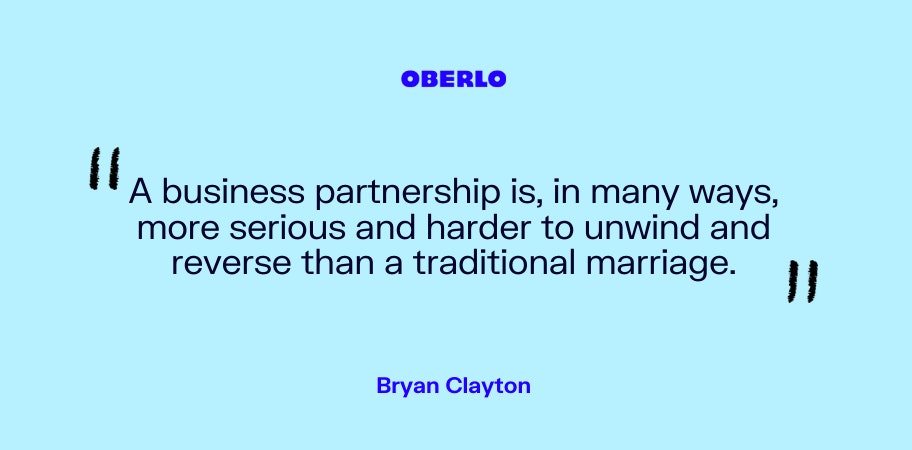
So, really thinking that through first and foremost, try to figure out a way to do it without partners, a lot of this stuff that you think you need a partner for, you candelegateand you can get contractors to help you with.
So don't get married until it really feels right, like the same as for business partnerships, unless you really just are in love with that partner and you wanna start a business with them and you wanna get in the trenches with them for a decade, then yes.
Most great businesses were done by a couple or three partners. So if it's a match made in heaven, go for it. But don't try to force it.
Don't try to jump in the trenches with somebody when it's not perfect, it's not right.
And you know that there are probably things that they're gonna cause you not to work well with them. Because not only are you gonna spend a lot of time with this person, but if you get that decision wrong, it can really torpedo your business.
Because if they don't pull their weight or they don't have the expertise that you thought they did, and now you've got all this dead weight, and it can be the cause or the thing that causes you to give up.
Aleisha:这是这样一个很好的类比。约会和公共汽车iness partner situations 'cause I think you're right, there are a lot of stories you sort of hear where people have jumped in and also just about personality and figuring out if you actually like this person and if they problem-solve in the same way and yeah, it can be...
我mean, I think about all the different workplaces I've been over the last of 20 years and think, gee, there are a lot of people I don't really wanna spend extra time with outside of work and who might be great at their jobs, but not necessarily people I wanna hang out with.
And I think when you were just talking about marriage and work, I was thinking about going, yeah, there's not a lot of those people that I would wanna have to burn the midnight oil with and order a pizza with around the desk that doesn't involve working for someone else.
Bryan:So, we're literally talking 60-, 70-, 80-, 90-hour weeks in the first few years to get it going and you better just really love working with that person.
Aleisha:Do your dating... Do your...
Bryan:Do your dating, do your founder dating.
Treating Customer Service Like an R&D Center
Aleisha:Your corporate dating. Founder dating is very important.
Bryan, let's talk about the day-to-day running now of GreenPal, and just a little bit aboutcustomer service, which I think seems to be a huge, a big part of your business. It's finding the people that do the job and then making sure they're doing it properly.
→ Click Here to Launch Your Online Business with Shopify
And customer service inecommerce, whether you're selling a physical product or a service as well, is so important.
So I wanted to maybe get some of your best tips for customer service and also when you're launching a business, how we can service the people that are helping us by funding us, by giving us money.
所以GreenPal,告诉我一点关于你如何走about making sure your customers are happy because you've got a lot of... Are they subcontractors that work for you in the mowing and doing all the work?
Bryan:So the marketplace connects buyers and sellers. And so we have homeowners that come on to the app, need to get their grass cut, and we connect them with contractors that do that work, and we take a small transactional fee. So the lawn mowing services that use a platform don't work for us. They use our technology to run their business.
But the home owners that use our platform, we have to serve them. We have to answer their questions, we have to figure out what went wrong when things go wrong. And for us, a lot of people wanna look at customer service as like a cost center, or as a liability, or as they wanna frame it as just something that has to be done.
And for us, because we're bootstrapped, we haven't raised any outside capital,we've looked at customer service and customer feedback as like our R&D center, as the thing that causes us to constantly have the ship steered in the right direction.
我n the early days, and even now, we've made it as simple as possible for people to reach us, to talk to us, to tell us what's going on, tell us what they're disappointed about, tell us what they wish it would do, tell us where they're happy.And on every interface on the app and website, there's a chat screen, a chat bubble that goes right to somebody that instantly picks up.
And I myself still do like an hour or two of customer service tickets every day because I don't want there to be a gap between customer logic and company logic.
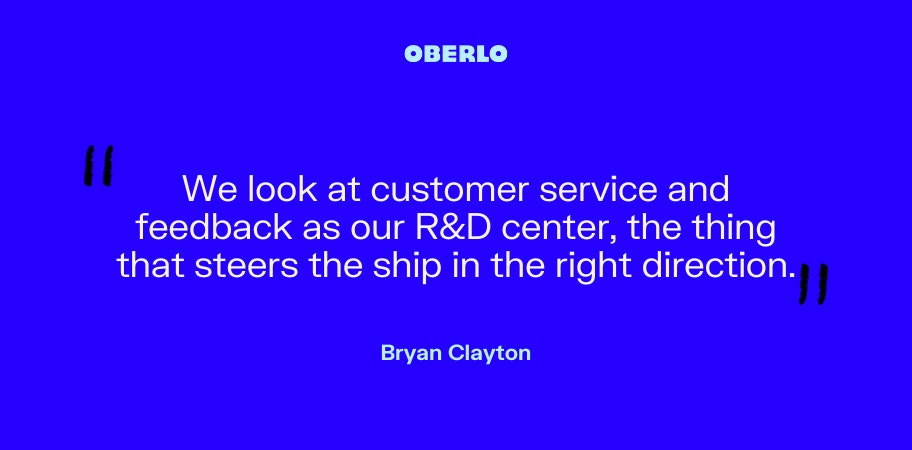
Aleisha:Oh, that's good.
Bryan:So most companies look at everything from company logic, what are the company's objectives, what is the company trying to do, what are the company's problems, and then as time goes on, there's this big chasm that develops between company logic and customer logic.
And so if you're always talking with your customer, making it really easy for them to talk to you, you close that gap and you're never at a loss for, "Okay, well, we've got 23 engineers that are working on stuff in this company. What should they be working on? What are the features they should be building? What are the bugs they should be fixing?"
And I don't just mean technical bugs, but just little things that the customer wished or expected to happen that didn't. And so if you're always speaking with the people using your product on a daily basis, you're never at a loss or a wonder as to what these people should be... What your team should be working on.
Aleisha:And I suppose it's a thing about customer service and getting in there early on, and especially if you'restarting an ecommerce business或一个应用程序,像你说的,你能理解e challenges that are being faced by your customers, but also yes, sometimes really simple solutions that can come in and be found once you've had a bit of a hands-on look like you.
我t's fantastic to hear that. And I love that you're doing the hour a day.
Bryan:Yeah. And in the early days, it's hand-cranking sales too, which you desperately need to get revenue. So it's two-fold. It's not like, "Oh, what does this customer want?" It's like, "Oh, I need to know what's going on, and, A, I need to get that sale, but, B, that's leading us in the right direction."And it's like customer feedback is not happening to you as the entrepreneur, it's happening for you.
When I go to a restaurant and the service sucks, I just don't say anything and I never go back. My friend that I go with, he is all over the waiters. He is... "Can I talk to the manager?" It is embarrassing, and it's like you want my friend as your customer, believe it or not. You don't want me because my friend's gonna tell you where you stink. He's gonna tell you what you need to work on. Me, I'm just not coming back, and I'm not gonna give anybody a recommendation.
So it's like you want that customer, you want that customer that's gonna tell you where you come up short, so then you know what you need to be working on.
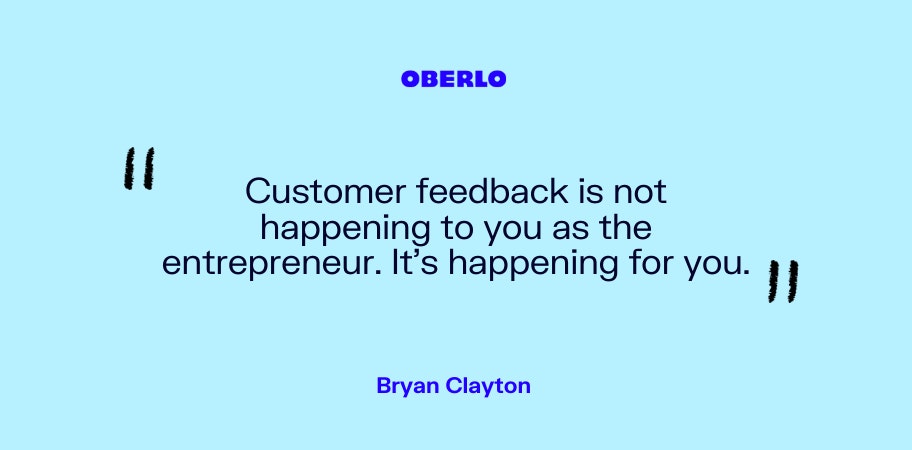
Building a Business on Customer Retention
Aleisha:Well, then let's go look atcustomer retentionthen and how you make sure people come back ‘cause I think that's a big thing as well with people who go, "Yeah, I've got a sale," but it's also like, as you said with the restaurant to say, "Okay, how do we get people to come back? And then how do we get people to come back to GreenPal?"
我s it about just excellent customer service, making sure the job is done? Is it about offering discounts? Or is it just about being able to offer a service that you know is ongoing, which is obviously a great place to be in from your perspective, because people's lawn, it grows and then it needs to be mowed again?
→ Click Here to Launch Your Online Business with Shopify
Bryan:Yeah, our business is built on retention because we can't just go out and buy a bunch of new customers. We have to keep and hold on to the ones that use our product. And we have found the best way to do that is to focus on service provider quality.
So if they use our app and they get hooked up with a lawn mowing service that didn't do a good job of getting the weeds out of the garden and didn't make nice edges on the driveway, it doesn't matter how good our technology is, or how good our app is, or how well-designed our app is, or how fast it runs. They're not coming back. It didn't do what it was supposed to do.
So we relentlessly focused on how to promote good service providers and sideline and demote the bad ones.
And so we have about 20 different metrics that we use to measure the service providers that use our platform in terms of: Do they show up on time? Do they get booked for a second lawn mowing? Do they get good star ratings from their clients? Do they win a lot of the bids that they quote? Are they quoting a fair price or too high or too low?
And so it's like all of these different things that we measure, and then we use that data to promote the best performing vendors and surface them to where a homeowner can just hire them right off the shelf, kind of like Amazon. And then the ones that aren't reliable, that don't show up on time, they get demoted and sometimes expelled from the platform.
And so that's our value proposition. The homeowner comes on to our platform and they can get done in a minute what might take them a week or a month and several different spins of trying different people in their neighborhood. We solve all of that for them just through the data that our platform acquires and measuring who's doing well and who's not, and that's the biggest lever we can pull to keep customers using the product.
So certainly, we have messaging in place to try to pull them back in likeemail marketingand what we call red-flag metrics when somebody's going cold, we try to pull them back in, that stuff, table stakes, but really atthe essence of retention is just offering a good, delightful experienceof: I push a button, I get a great person to come mow the yard at a good price, and they show up when they're supposed to.
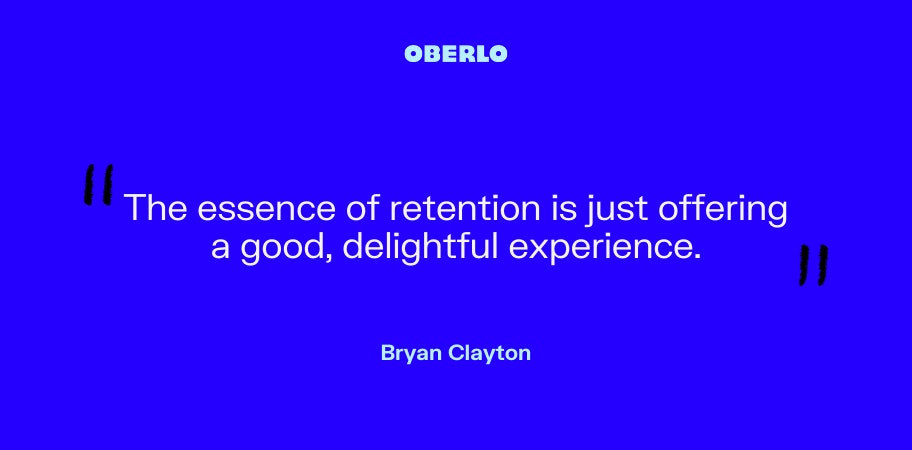
Aleisha:Yeah, which is all we can hope for, especially when you're providing a service-based business, it's just yeah, someone does what you're paying them to do with minimal fuss, and you bring them back again next month.
Bryan:Exactly.
Aleisha:Yeah, and that's great. I don't want people to be... I think when people listen to this podcast, it's often thinking about a physical product, and I actually think that a lot of the times, obviously some of the best ideas, the most profitable ideas that have been out in the last ten years have been service-based ideas.
So I think it's great to sort of hopefully spark a bit of interest from our listeners who might be like, "I don't know if I wanna sell something, but maybe I'm really good at doing something or providing a service."
So it's really great speaking with you, Bryan, 'cause I hope it's given some people listening a bit of inspiration to maybe think outside the box when it comes to wanting to sell products, but maybe they've got a great service they can help people with.
Bryan:Absolutely, it's my pleasure.
Aleisha:Bryan, before we go, I have to ask you, I've moved into a new home in November, the lawn is a little crappy, let's talk about your best lawn care tips.
No, I'm recording in Australia. So it is the middle of summer, and I've been told, "Listen, just ride it out for the rest of summer and then fix it in winter. Don't try and fix the lawn now." Is that the right advice?
Bryan:That's actually, believe it or not, the right advice. When it's hot, the lawn is, it's... Just try again next year. Temperatures have to be just right for that grass to start growing again.
Aleisha:Good. I'm gonna blame it on the previous homeowner and say, "Look, I didn't mess it up."
Bryan:我t's not your fault.
Aleisha:我talk to it, I mow it, but it is in dire need of some weeding and some help. And that's why we need GreenPal in Australia, so if you can get that cooking, that'd be great.
Bryan:We'll be there soon enough.
Aleisha:Hey, Bryan, if people wanna check out more of what you do and learn more about your business, where can they reach you and maybe book a lawn mowing, hopefully.
Bryan:Yeah, anybody listening to this in the United States that doesn't wanna waste time mowing their own yard, they can just download GreenPal in the App Store or Play Store. Anybody that wants to reach me, LinkedIn's the best way to get me. You can justshoot me a message there.
Aleisha:Great. Hey, Bryan, thank you so much for your time. It's been lovely speaking with you. I'm gonna go and talk to my lawn right now and hopefully inspire it to not die.
Bryan:My pleasure. Thanks for having me on.
Want to Learn More?
- 8 Months and $1M Later: How One First-Time Ecommerce Entrepreneur Made His Fortune
- This Is Not an Overnight Success Story: How Harry Grew His Million Dollar Businesses
- This Entrepreneur’s One Product Store Made $680k in Three Months. Then He Shut It All Down.
- Meet the College Student Trying to Graduate While Building a Million Dollar Empire